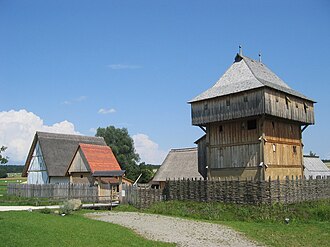Manorialism




Manorialism, also known as the manorial system, was a crucial component of the feudal system that dominated medieval Europe. It was a socio-economic structure that governed the allocation of land and the relationships between the landowners, known as lords or nobles, and those who worked the land, known as serfs or villeins. This article aims to provide a comprehensive overview of manorialism, its origins, functions, and eventual decline.
Origins and Development[edit]
Manorialism originated in the late Roman Empire as the rural economy began to collapse under the pressure of invasions and declining trade. As Roman estates grew increasingly autonomous, providing for their own defense and sustenance, the groundwork for manorialism was laid. The system fully emerged in the Carolingian Empire during the 8th and 9th centuries, as rulers granted lands to their nobles in exchange for military service. These lands, or manors, became the basic units of economic power and social organization in medieval Europe.
Structure[edit]
The manor was the heart of the manorial system. It consisted of the lord's residence, peasant villages, and the surrounding lands, including arable fields, pastures, forests, and wastelands. The manor was largely self-sufficient, with peasants producing the food, clothing, and other necessities for themselves and their lord.
The lord of the manor held legal and economic power over the serfs, who were bound to the land. Serfs were required to work the lord's demesne (land directly managed by the lord) for several days each week and to pay rents and taxes in the form of crops, labor, or coin. In return, the lord provided protection and the right to work certain plots of land for their own use.
Economic and Social Aspects[edit]
Manorialism was characterized by a subsistence economy, with little trade or commerce. The manor produced most of what was needed by its inhabitants, with little surplus for trade. The system was inherently hierarchical, with a clear distinction between the social classes. The nobility enjoyed privileges and power, while the serfs were subject to their authority and had limited rights.
Decline[edit]
The decline of manorialism began in the 13th century and was hastened by several factors, including the Black Death, which drastically reduced the population and the labor force. This led to a labor shortage, giving serfs more bargaining power. Economic changes, such as the rise of market economies and the growth of towns and trade, also undermined the manorial system. By the end of the Middle Ages, manorialism had largely given way to more modern forms of economic organization, although remnants of the system persisted in some areas into the modern era.
Legacy[edit]
Manorialism left a lasting imprint on European society and its landscapes. Many modern European rural landscapes, with their villages, fields, and pastures, can trace their origins back to the manorial system. The system also had a profound impact on legal and social structures, influencing the development of European feudalism and the hierarchical organization of society.
Ad. Transform your life with W8MD's Budget GLP-1 injections from $75


W8MD offers a medical weight loss program to lose weight in Philadelphia. Our physician-supervised medical weight loss provides:
- Weight loss injections in NYC (generic and brand names):
- Zepbound / Mounjaro, Wegovy / Ozempic, Saxenda
- Most insurances accepted or discounted self-pay rates. We will obtain insurance prior authorizations if needed.
- Generic GLP1 weight loss injections from $75 for the starting dose.
- Also offer prescription weight loss medications including Phentermine, Qsymia, Diethylpropion, Contrave etc.
NYC weight loss doctor appointmentsNYC weight loss doctor appointments
Start your NYC weight loss journey today at our NYC medical weight loss and Philadelphia medical weight loss clinics.
- Call 718-946-5500 to lose weight in NYC or for medical weight loss in Philadelphia 215-676-2334.
- Tags:NYC medical weight loss, Philadelphia lose weight Zepbound NYC, Budget GLP1 weight loss injections, Wegovy Philadelphia, Wegovy NYC, Philadelphia medical weight loss, Brookly weight loss and Wegovy NYC
|
WikiMD's Wellness Encyclopedia |
| Let Food Be Thy Medicine Medicine Thy Food - Hippocrates |
Medical Disclaimer: WikiMD is not a substitute for professional medical advice. The information on WikiMD is provided as an information resource only, may be incorrect, outdated or misleading, and is not to be used or relied on for any diagnostic or treatment purposes. Please consult your health care provider before making any healthcare decisions or for guidance about a specific medical condition. WikiMD expressly disclaims responsibility, and shall have no liability, for any damages, loss, injury, or liability whatsoever suffered as a result of your reliance on the information contained in this site. By visiting this site you agree to the foregoing terms and conditions, which may from time to time be changed or supplemented by WikiMD. If you do not agree to the foregoing terms and conditions, you should not enter or use this site. See full disclaimer.
Credits:Most images are courtesy of Wikimedia commons, and templates, categories Wikipedia, licensed under CC BY SA or similar.
Translate this page: - East Asian
中文,
日本,
한국어,
South Asian
हिन्दी,
தமிழ்,
తెలుగు,
Urdu,
ಕನ್ನಡ,
Southeast Asian
Indonesian,
Vietnamese,
Thai,
မြန်မာဘာသာ,
বাংলা
European
español,
Deutsch,
français,
Greek,
português do Brasil,
polski,
română,
русский,
Nederlands,
norsk,
svenska,
suomi,
Italian
Middle Eastern & African
عربى,
Turkish,
Persian,
Hebrew,
Afrikaans,
isiZulu,
Kiswahili,
Other
Bulgarian,
Hungarian,
Czech,
Swedish,
മലയാളം,
मराठी,
ਪੰਜਾਬੀ,
ગુજરાતી,
Portuguese,
Ukrainian
